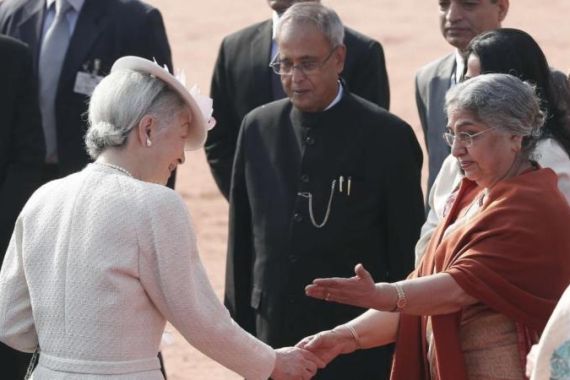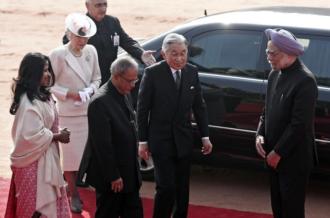Japan irked by India president’s grave visit
Visit to war cemetery while Japan royal couple is in India does not go down well with visiting entourage.

Indian President Pranab Mukherjee’s visit to a Second World War memorial at a time when the Japanese emperor is visiting the country has seemingly irked Tokyo.
President Mukherjee visited the Commonwealth War Graves in Kohima, the capital city of Nagaland state in India’s far east, on Saturday – the day Japanese Emperor Akihito and his wife Empress Michiko landed in New Delhi on a six-day visit..
After laying a wreath at the War memorial, the President said he was honoured to visit the Kohima War Cemetery “built on the very site where hundreds of gallant British and Indian soldiers fought and achieved martyrdom.”
He said there was “no mistaking the meaning, significance and the enormity of this hallowed site where lie the mortal remains of those who distinguished themselves through their acts of conspicuous gallantry and intrepidity at the risk of his life above and beyond the call of duty.”
The terraced cemetery is memorial to 1921 British soldiers who were buried here while the names of 917 Indian soldiers are inscribed in a plaque who laid down their lives fighting the Japanese forces between April and June 1944.
This has not gone down well with the Japanese when their royal couple is in India.
‘Better avoided’
“It is India’s internal matter and we are not complaining about it but it would have been better if this was avoided, ” a senior Japanese diplomat in India told Al Jazeera.
He said this will not derail anything that Japan and India plan to do to carry forward their excellent bilateral relations .
“But why rake this up now when our royals are here,” the diplomat said, but he was unwilling to be named.
India’s left leader Asoke Ghosh also hit out at President Mukherjee.
“The Indian soldiers who died with the British served the Empire, but the soldiers of the Indian National Army (INA) led by our independence war hero Subhas Chandra Bose were fighting alongside the Japanese,” said Ghosh.
“Those INA soldiers were the real matyrs, they fought for our freedom,” said Ghosh, whose Forward Bloc party was founded by Subhas Chandra Bose in the late 1930s after he broke away from the Congress.
Bose raised the INA from the Indian prisoners captured by the Japanese during their sweep into Southeast Asia in 1942-43.
Ghosh says the Congress leaders like Jawaharlal Nehru defended the INA prisoners when they were later tried by the British for desertion and waging war against the Empire.
“But it is sad that Mukherjee who is a Congress leader hails those who fought for the British as martyrs and not those who fought for our freedom,” said Ghosh.
 |
| Emperor Akihito and Empress Michiko are on a six-day state visit to India. [Adnan Abidi/Reuters] |
The British built memorials to honour their dead soldiers in Kohima and Imphal in neighbouring Manipur state after the War.
The road that connects Kohima to Imphal was the line where the British held up the Japanese-INA advance and turned the tide of the war in Asia. British general Bill Slim aptly titled his book on these battles “Defeat into Victory”.
The road now has dozens of plaques that reminds travellers – ” You are travelling on the historic road, the battleground of Second World War”.
The Japanese royals are reliving their 1960 honeymoon visit to India when they were hosted by India’s first president Rajendra Prasad.
Tokyo says the royal visit signifies a new high in India-Japan relations – like their visit to China in 1992 did. But while Japan’s relations with China has cooled for a number of reasons and led to fresh tensions over disputed islands, its relations with India has grown after a cool-off phase that followed India’s nuclear explosions in the late 1990s.
The two countries are trying to develop close strategic and economic relations, though India makes it clear this is not aimed at China. The Japanese emperor on his arrival in Delhi made it clear that his visit was not aimed at “countering” China.
“The visit should not be interpreted as an effort to counter China. There is no intention whatsoever to counter China through the visit .The visit is non-political,” Sakutaro Tanino, press secretary to the emperor, said in Delhi on Sunday.
But analysts say the ‘China factor’ surely draws India and Japan closer to each other .
The royal couple was received by Prime Minister Manmohan Singh and his wife Gursharan Kaur at the Air Force station at Palam, in a departure from the usual protocol.
Tanino said Japan was “touched” by Singh’s gesture to receive the royal couple at the airport and said that his country wants relations to deepen further.